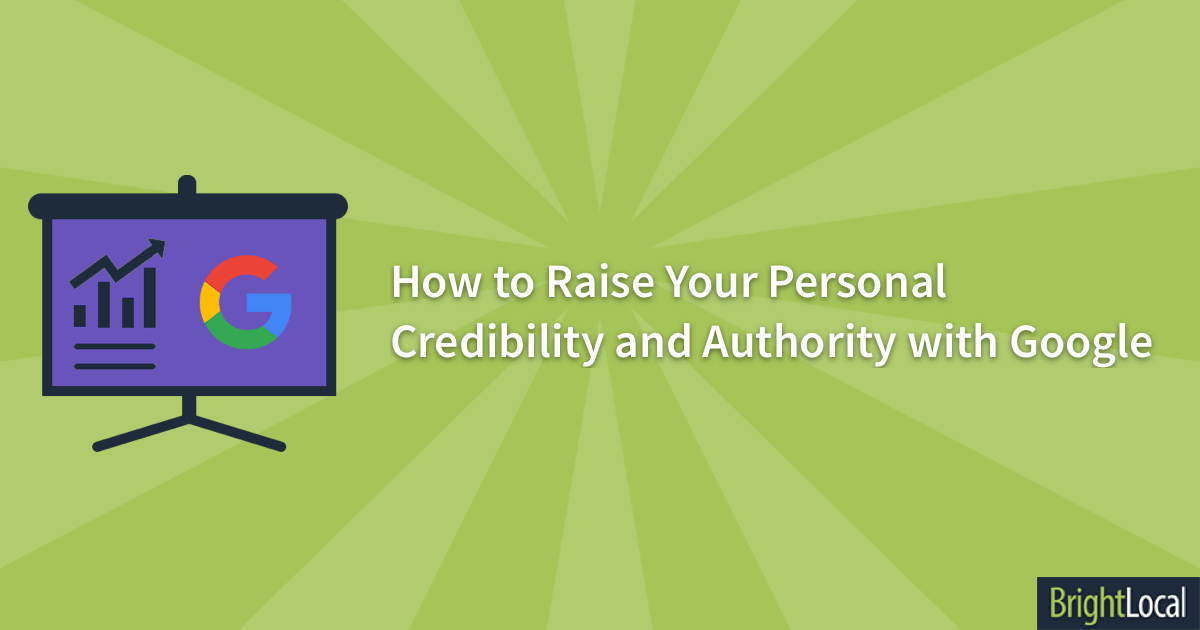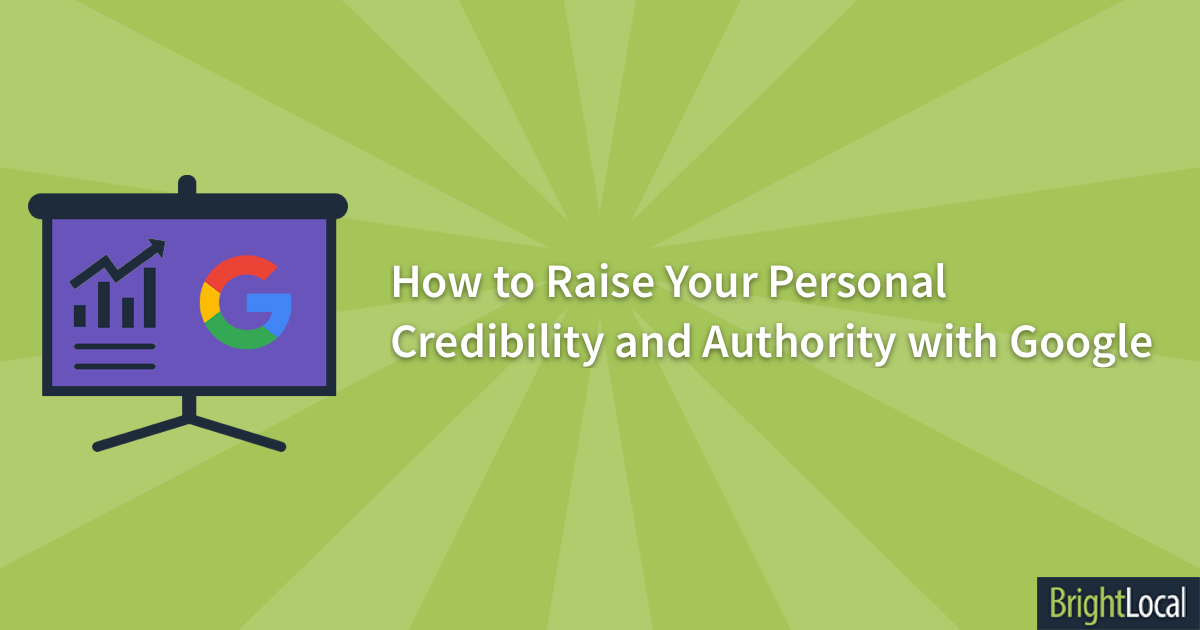
If you work with SEO, you’ll need no convincing of the power of trust. It’s the backbone of better rankings, and in business as in life, reputation usually precedes you – meaning if you take the time to cultivate trust, authority, and credibility with Google, you’re much more likely to receive assistance from the search engine in return.
Raising your personal credibility with Google is something that SEOs and in-house marketers alike can benefit from. Building your standing and demonstrating authority brings with it a number of benefits;
- Google support staff are more likely to take your queries and requests seriously if they know and trust you – making it easier to do better work on client campaigns.
- Issues such as fake reviews or spam become easier to deal with – because Google knows the request is coming from a credible, trustworthy source.
- It becomes easier to get edits to your Google My Business listings approved, easier to get rid of spam listings, and easier to reclaim your Google My Business listing should another party lock you out of your account.
- Your standing as an SEO professional is sure to receive a boost if you can add ‘Google Top Contributor’ or ‘Google Local Guide’ to your business card and email signature.
- Your personal brand will also benefit, as you’re much more likely to be in demand for guest blog posts and speaking slots. You can use this to become an SEO personality in your own right, putting you in the running for more lucrative contracts with bigger and better-paying clients.
- To become a trusted and authoritative individual in Google’s eyes, you’ll have to be a regular contributor and user of its products, perhaps by participating in beta tests and becoming an active forum member. This insight and experience will inevitably give you a much better understanding of its products and tools, too – further helping your SEO work.
So where do you start in getting Google to trust you (and your Google account) as a person rather than just trusting your website?
Become a Google Local Guide
Google Local Guides are armies of Google Maps users who review a range of local businesses on a regular basis. To become a Local Guide, you’ll need to sign up at maps.google.com and take a proactive approach to sharing tips, images, and reviews of local businesses and new local destinations.
You’ll be awarded points for each review or image you share, and the more points you accrue, the higher your level as a Guide will become. As you progress through the levels, you’ll unlock certain Google benefits, such as early access to new features, and Google partner perks. When you reach level four, you’ll receive a Local Guides badge which will show on your profile – this is a recognition of your authority in a particular area and an important step towards building credibility with Google.
Technology writer and content strategist, Derek Walter says you’ll earn your stripes quicker by coupling honest, frequent reviews with other Google product usage. He notes,
“Be sure to turn on Google Photos and enable Location History in Maps. You’ll start to see some rather cool (yet slightly creepy) integration of your photos everywhere you’ve been with your phone.
“Another way to score: add new venues to Google Maps. You’d be surprised how often a restaurant, coffee shop, or store hours are incorrect or not listed at all. If you add in the name, address, hours, and other details about the place you’ll get a nice points boost (though these will sit in a review queue before they go live).”
Make regular Google Maps edits
Ever since local search became an SEO priority, Google Maps has been subject to black hat SEO techniques. Search Engine Land columnist and Google My Business Top Contributor Joy Hawkins says that keyword stuffing business names is rife in Maps listings, with many SEO companies guilty of using this tactic to boost their clients’ rankings.
Google has a series of guidelines for Google Maps listings which outline unacceptable practices, including the use of PO Boxes or mailboxes for addresses, the use of keywords or any other information other than the official business name in the title, and creating multiple listings.
Making regular edits to local business listings to improve their accuracy is another way to help build your credibility with Google. Once you find an inaccurate listing or a spammy maps inclusion, it’s easy to send feedback – if you’re signed in to your Google Account as you view Maps, simply click on Menu > Send feedback > Edit the map, and then supply details of the error.
It makes sense here to start by focusing on your local area, as that’s where you’re most likely to easily spot mistakes such as incorrect road names, non-existent businesses and listings guilty of keyword stuffing.
You can also tie in Maps edits with forum contributions to further bolster your standing and interaction with Google – this can help you progress to Top Contributor status. Visit the Google My Business forum to get started, or send a report to Help on Social. Be clear why you are making the report and what the issue actually is.
Join the Google Help Forums and contribute regularly
Google advises anyone wanting to become a Top Contributor to start by becoming a rising star on the Google Help Forums. Here, you’ll need to regularly answer questions from users, providing sound advice and step-by-step solutions on any one of 51 forums and communities. Forums vary from Webmaster Central Help, AdSense Help and Google Search and Assistant Help, right through to DoubleClick Publisher, Tag Manager and Blogger Help.
Google says that it looks for a number of things before inviting individuals to become a Top Contributor. Participation is key here and as a minimum you must:
- Be an active member in the Google Help Forums and/or Help on Social
- Be a member of the forum and/or Help on Social for a minimum of four months
- Be active in the Google Help Forum and/or Help on Social on most days
- Promote and contribute to the health of the forum
Those invited to be Top Contributors must also maintain an appropriate communication style when interacting with others. This includes providing clear, detailed responses, displaying patience, having a friendly manner, and maintaining a positive attitude when interacting with Google’s team, other Top Contributors, and forum members. You must additionally demonstrate excellent Google product knowledge and be able to provide useful and constructive feedback.
Be active within your own industry
We’ve often advised that when it comes to building a stellar review profile for your business, a breadth of review sources is a hallmark of credibility. After all, neither Google or customers will just rely on one particular platform or site when trying to build an overall impression of your business. You can apply this same school of thought to building your personal reputation with Google.
While you will need to be active on Google products, forums and programs, it’s also wise to become a member of relevant industry associations and organizations, too. Google will often cross-check listings with national industry associations as a way of verifying legitimacy, so consider organizations such as The American Marketing Association (AMA), the Data and Marketing Association (which Google, Twitter and Facebook are all members of), and IAB.
We’d love to hear your thoughts
What steps have you taken to build your own authority and credibility with Google? What business benefits have you enjoyed as a result? We’d love to hear your experiences and tips so share them in the comments below.
In the meantime, I wish you luck on your Hero’s Journey to become a knight of Google Justice!


